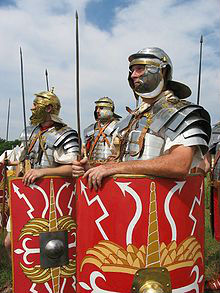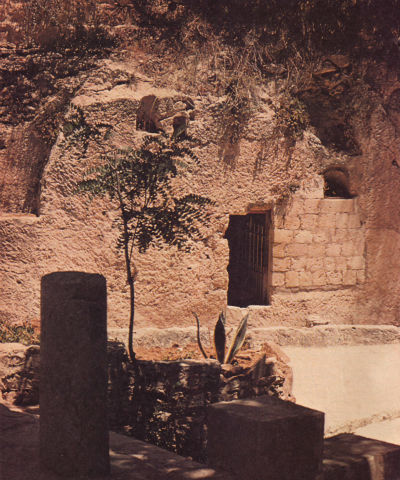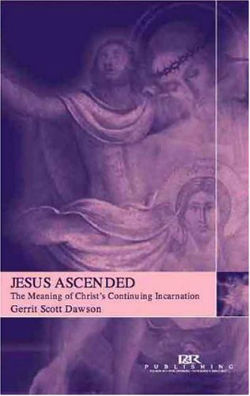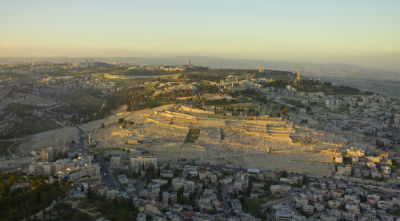 Roman guard: Even the might of Rome could not prevent God's plan from moving forward via resurrection.
Roman guard: Even the might of Rome could not prevent God's plan from moving forward via resurrection.By Neil Earle
 Roman guard: Even the might of Rome could not prevent God's plan from moving forward via resurrection.
Roman guard: Even the might of Rome could not prevent God's plan from moving forward via resurrection.So what do we focus on after Easter?
Easter of course was all about the Resurrection and Ascension of Jesus to kingly glory.
The early church fathers – often facing martyrdom – followed St. Paul in praising the risen Jesus as One who had “disarmed the powers and authorities, made a public spectacle of them, triumphing over them by the cross” (Colossians 15).
The cross was supposed to silence the Jesus Movement forever but it had the exact opposite effect. Jesus’ Resurrection and Ascension displayed God’s ultimate triumph over the forces of sin, death and worldly power and His reception back to heaven to prepare a place for us. This theme meant a lot to the early, persecuted church, knowing the tough times that faced them, as it faces many right now.
Some of them put it all in readable and even romantic terms. Justin Martyr (155AD in Rome) wrote that “when the rulers of heaven saw Him of uncomely and dishonored appearance not recognizing him, they inquired, ‘Who is this King of glory? And the Holy Spirit answered them, The Lord of hosts, He is this king of glory’” (Psalm 24:10). Hints of this appeared in Revelation 5:6 – the martyred Lamb “seeming to be dead” but now alive.
 The garden tomb in Jerusalem
The garden tomb in JerusalemIrenaeus of Lyon (d. 200) employed Psalm 68:18 (“Let God arise”) to state, “He (Jesus) has summed up all things, in order that, as our species went down to death through a vanquished man, so we may ascend to life again through a victorious one” (See 2 Corinthians 5:14-15).
Tertullian of Carthage (d. 225) saw Psalm 68:18 as meaning “Christ himself, when returned to heaven, sent spiritual gifts. He ascended up on high, that is, to heaven: ‘He led captivity captive,’ meaning death.”
Athanasius of Alexandria (d. 373) expounded Psalm 24:3 as “He sanctifies himself to the Father for our sakes that he himself may sanctify us and that we may enter the gates of heaven which he has also opened for us.”
What were these writers getting at?
The Ascension opens up heaven to God’s children. Jesus told Mary Magdalene in the garden that “I am returning to my Father and your Father to my God and your God” showing we are “in on the deal.” The Ascension completes the Resurrection accounts. Otherwise where is Jesus?

Gerritt Dawson in Jesus Ascended says, “We have been granted entrance into heavenly participation in the life of God.” Paul is quite clear that Jesus passed through time and space and “entered the Most Holy Place once for all having obtained eternal redemption” (Hebrews 9:12). God “put all things under his feet” (Ephesians 1:22) so he could lead the church in a hostile world. He left earth to fill the universe and be with us forever and control all things – what Christian thinkers later explained in a somewhat thrilling phrase, the Cosmic Christ. “In him,” said Paul, “all things hold together.”
And yet, as the analytical William Barclay implies, Jesus’ career after the Resurrection/Ascension is almost a Cinderella Doctrine. It is difficult to visualize and explain. It is hardly preached upon. Artists do a poor job depicting it. Still, as Barclay himself reminds us, the teaching is anchored in the great Creeds of the church (Nicene, Athanasian, Apostolic). The reports of Jesus departing are in Mark 16:19, Luke 24:51 and Acts 1:9-11. These texts clearly show Jesus ascending from the Mount of Olives. Needless to say, these accounts have produced skeptical questions about whether the apostles were working with an old-fashioned “three-tiered universe” in their minds. That is, Grave/Earth/Heaven.
But Barclay also adds that the Resurrection and Ascension of Jesus are “inextricably linked together…They are milestones in that process whereby Jesus, crucified, risen and ascended, entered finally into the glory of God” (The Apostles Creed, p.142 ). In Ephesians, the Ascension is that supreme act of God’s power “which he worked in Christ when He raised him from the dead and seated him at his right hand in the heavenly places, far above all principality and power and might and dominion and every name that is named, not only in this age but also in that which is to come “(Ephesians 1:20-21)
The Romans could not destroy him and the grave could not hold him. But what does all this mean for us?
 Mount of Olives in Jerusalem
Mount of Olives in JerusalemAt the time of the Reformation the Ascension once again came into play as an important teaching for those sometimes facing an early death. John Calvin and others saw Christ’s ascension as the guarantee of our future glorification. These thinkers knew what doubting Thomas had learned the hard way – Jesus has a body like ours, but glorified. Consider this: The man Jesus our Mediator (1 Timothy 2:5) united God and man in the Incarnation at Bethlehem. But he “sealed the deal” by his appearances as the Risen Lord in the upper room. “Here, touch my hand and my feet.” Now we have glorified human flesh enthroned in heaven as Jesus our Forerunner (Hebrews 6:20) who has gone through life, death and entrance to heaven – “through the veil” as the author of Hebrews 10:19-20 tells us in no uncertain terms.
This is why St. Paul taught the almost giddy truth that Christians already “sit together in the heavenly places in Christ.” It was all for us and for those who believe through our testimony. “He died and rose in the flesh so that we may partake of His dying and rising,” says Gerritt Dawson. “He wears our sinful skin shamelessly…from the moment of his incarnation Jesus was redeeming and cleansing our humanity” (p. 94).
We can conclude from all this that we do indeed have a Friend in high places. As C.S. Lewis wrote, in heaven we will be warmly received. The early writer Tertullian put it boldly and dramatically: “Heaven lies open to the Christian, that way of ascent was leveled with the footsteps of the Lord and an entrance opened up by the might of Christ…no reply or inquest will meet Christians on the threshold since (they are) owned and not put to the question but received in” (Dawson, p. 65).
The Ascension means Jesus has gone on ahead to prepare a place for us, as he said (John 14:1-2). We are left here to make God’s intentions for reconciling the human race known and heard, and, once our personal journey is finished, we shall learn that our labor is not in vain in the Lord (Luke 12:37).
This gives added meaning – indeed it fulfills the meaning – of the Easter accounts and the dramatic appearances of the Risen Lord. Thank God once more for his wonderful Plan.